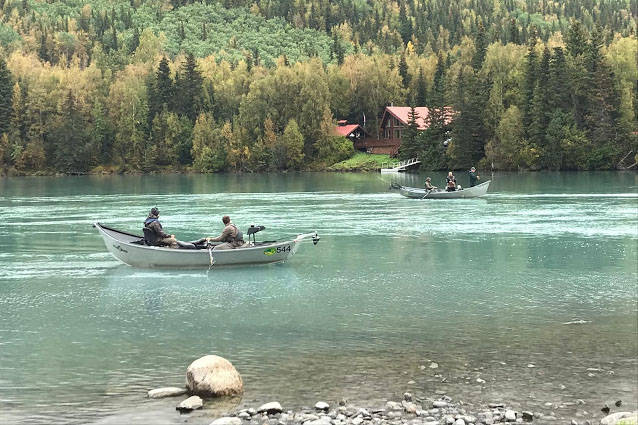Normally, with friends on every side of the issue, we prefer to stay away from fish politics. Between all the different user groups, there always seems to be unlimited demand for a finite resource like salmon. Maximizing the benefits of the fishery for all Alaskans is a difficult task — but it’s the constitutional obligation of the Board of Fisheries.
Let’s talk about the economic impact of fishing. Not a big boat with big nets hauling in hundreds of fish at a time. We’re talking about one person in waders with a pole or dipnet standing in the water. How much do you think that activity is worth to Alaska’s economy?
It’s a lot. When multiplied by the nearly half-million individuals who purchase fishing licenses statewide every year, that “a lot” becomes huge.
There seems to be a misconception within our state that commercial fishing is business and sportfishing is just for fun.
In 2017, anglers fished a total of nearly 1 million days in the Cook Inlet region alone and spent $716.5 million on trip-related goods and services, pre-purchased packages, equipment and real estate used for fishing. The dollars, Euros and yen spent by those smiling grandparents, laughing kids and excited visitors supports a mind-boggling variety of businesses, from outfitters in their hometowns to gas stations and restaurants along the way to all the many businesses near the rivers and campsites.
That money is then spent at other businesses, radiating throughout our entire economy. Money spent at a Wasilla grocery store in preparation for a fishing trip on the Kenai, for example, enables that store to pay its employees, who then buy vehicles and homes, clothes for their children, and on and on.
The stats above come from an economic-research firm which also stated that as anglers’ dollars moved from business to business in the Cook Inlet economy, the total effects of the spending in 2017 generated $832.4 million in economic output and supported more than 6,300 jobs, providing $271.4 million in household income. We’re talking about people’s lives here.
Even more mind-boggling is this: Sportfishing anglers caught approximately 28% of the salmon harvested in Cook Inlet in 2017, but had an economic impact nearly 3 times greater than the commercial sector in the same area.
The sportfishing economy saw spending by both residents and non-residents equally. Tourist spending adds new money to our communities, which increases Alaska’s employment, businesses, tax revenues and virtually every other part of our interconnected economy.
The point of this op-ed is not to ask you to choose between sport and commercial fishing. Rather, it is to point out that sportfishing is immensely valuable to our statewide economy — and that our state agencies should recognize that different regions of Alaska are impacted differently by sport and commercial fishing. There are very few people going to Dutch Harbor for fly-fishing, for example. In Unalaska, commercial fishing deserves to be given priority.
But here in Southcentral, the greatest value of our fishery is realized when we send fish directly to the dipnets, flies, plugs and freezers of individual anglers. In other words, in Cook Inlet sportfishing is the moneymaker.
And this issue goes well beyond finances. Fishing is part of who we are as Alaskans. We Alaskans don’t just like fishing, we don’t just highly value fishing — we need fishing.
Dipnetting fills Alaska families’ freezers so they have food through winter. When Alaskans take a week vacation in July, they’re likely going to Kasilof with high hopes of quality time with their children and a bounty they’ll be able to count on in January and February.
To Alaskans, so-called “sport” fishing is part of our culture. And it’s part of how we feed our families. It’s also part of how we power our economy.
In just a few weeks, there will be a meeting in Anchorage to decide issues that are critical to thousands of small business owners like us — Alaska’s fish resources in Cook Inlet.
The Board of Fisheries should be making oversight decisions, such as regulations and allocations, that increase the sport and personal-use fisheries. Reasonable, shared conservation measures and a focus on access to abundance should guide decisions made by the Board.
Those happy dipnetters and fly casters are worth a lot to the warehouse worker at your local grocery store, the mechanic who lives next door, your child’s teacher, and everyone else who lives and works in the great state of Alaska.
This piece was co-authored by several small business owners throughout the Cook Inlet region that live, work and play in Alaska full time. They understand the essential role sportfishing holds to people, businesses and the state alike.
Jim Tilton and Maria Staffieri own and operate Deshka Landing Charters and Lodge in Willow. Dustin Slinker owns and operates the Bait Shack in Anchorage. Jerry and Cheryle James own and operate Wildman’s in Cooper Landing. Brian Richards is the co-founder of Wilderness Way in Soldotna. Mike Hudson owns and operates 3 Rivers Fly and Tackle in Wasilla.


